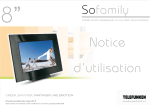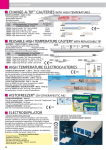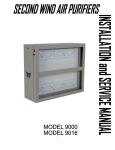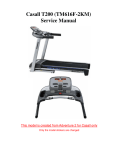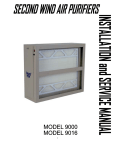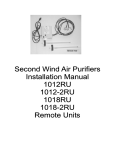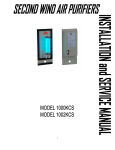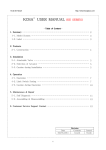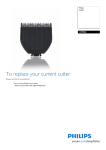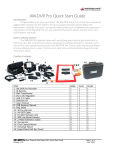Download 2007 Sears Treadmill Service Manual
Transcript
H o r i z o n Fitness Models RST 5.6 RCT 7.6 2007 Sears Treadmill Service Manual Table Of Contents Elevation Troubleshooting 3 No Motor Movement Troubleshooting 4 Erratic Speed Troubleshooting 5 Auto Calibration Troubleshooting 7 Console/Upper Board Troubleshooting 8 Membrane Keypad Overlay Troubleshooting 10 Safety Key/Reed Switch Troubleshooting 11 Heart Rate Troubleshooting 12 Circuit Breaker Troubleshooting 14 Engineering Mode 15 Digital Drive Wiring 17 RST 5.6 Upper Board 18 RCT 7.6 Upper Board 19 Power Source Wiring Diagram 20 No Motor Movement Voltage Check Points 21 Cut Console Cable Voltage Chart 23 Incline Wire Voltage Chart 25 Reseting The Incline Motor 26 Lubrication Procedure 27 RST5.6 & RCT 7 . 6 S e a r s S e r v i c e M a n u a l 2 0 0 7 No Motot Elevation Movement Troubleshooting Troubleshooting I t ’s recommended to send console cables for elevation repairs on all mode l s u s i n g s e ctional console cables. Symptom Possible Cause Test Procedure Repair Elevation motor starts running as soon as the power is turned on. Constant down. Failed lower board. -Turn on power. Do not press start. Wait 30-60 seconds and see if motor is hot. Use caution. Motor can get very hot. Replace lower board. Elevation motor bobs up and down with command. Failed elevation motor. Referance Incline Voltage Chart. (p. 25) Replace elevation motor. Elevation motor does not reach minimum or maximum settings. Failed elevation motor. -Verify there are no pinches or cuts on the elevation wires. -Verify the connections of above wires. Referance Incline WVoltage Chart. (p. 25) -Recalibrate elevation motor by hand. Referance Resetting the Incline Motor. (p. 25) -Replace elevation motor. Elevation is stuck down and does not function. Console is responsive to the buttons being pressed. Failed console cable. -Verify console cable connections. Verify there are no pinches or cuts in the cable. Referance Console Cable Voltage Chart. (p. 26) Replace console cable. Failed elevation motor. -Put machine in hardware test (Eng1) and press start. Elevation doesn’t respond buttons are pressed. (You may see a value for elevation that reads 255 or 1023. That value will not change when the buttons are pressed). Referance Incline Voltage Chart. (p. 25) Replace elevation motor. Failed upper board -Put machine in hardware test (Eng1) and press start. Incline will work in hardware test only. Replace upper board. Reference Engineering Modes (p.15) Elevation is stuck at the highest position and is will not come down. Console is responsive to the buttons being pressed. Failed upper board, lower board (very rare for models made after 2003), console cable, and elevation motor. -Verify all wire connections. Replace upper board, console cable, and elevation motor. Elevation inclines to the highest position as soon as power is applied. Failed lower board -If the incline went into the highest position without start being pressed. Replace lower board. The incline will go up, but not down. (very rare) Failed lower board -The incline will act normally when going up, but when the down incline is pressed there is no movement. Replace lower board. rst 5.6 & rct 7.6 service manual 2007_rev1.0 | RST5.6 & RCT 7 . 6 S e a r s S e r v i c e M a n u a l 2 0 0 7 No Motor Movement Troubleshooting Symptom No Motor Movement - Upon pressing start, console responds normally, keys respond normally, and elevation works but no belt movement. Possible Cause Test Procedure Repair Inadequate power. -Check for dedicated circuit (20 amp is ideal) and check wall outlet voltage (120 VAC) Reference Power Source Wiring Diagram. (p. 20) -Make sure machine is not on extension cord or surge protector. Reference No Motor Movement Voltage Checkpoints. (p. 21) If the AC voltage is missing or incorrect, check the AC service or consult an electrician. Damaged or improper wiring. -Verify there are no pinches or cuts in the power cord, power wires motor wires, or console cable. -Verify the connections of above wires and cords. Reference No Motor Movement Voltage Checkpoints. (p. 21) Replace parts as needed. Failed motor control board (MCB). -Verify power to MCB Reference No Motor Movement Voltage Checkpoints. (p. 21) Replace MCB. Failed drive motor. -Measure voltage output from motor. Reference No Motor Movement Voltage Checkpoints. (p. 21) Replace drive motor. Failed optic sensor. Reference No Motor Movement Voltage Checkpoints. (p. 21) Replace optic sensor. | rst 5.6 & rct 7.6 service manual 2007_rev1.0 RST5.6 & RCT 7 . 6 S e a r s S e r v i c e M a n u a l 2 0 0 7 Erratic Speed Troubleshooting Symptom Possible Cause Test Procedure Reference No Motor Movement Voltage Checkpoints. (p. 21) Repair Erratic speeds - Upon pressing start, belt speed increases rapidly and then comes to a complete stop quickly. Failed optic sensor. Erratic speeds - Upon pressing start, belt speed increases rapidly and does not stop. Failed motor control board (MCB). Erratic speeds - Running belt speed is not stable. Machine not calibrated properly. -Run auto calibration. Reference Engineering Mode. (p. 15 & p. 16) If unit fails to auto calibrate, refer to auto calibration troubleshooting. -Running belt is too loose or too tight. -Drive belt is too loose or too tight. -The running belt should not slip at all when customer is using the machine -The drive belt should have approximately 3/8 of inch deflection. -Tighten running belt. Reference Owners Manual. (p. 14) -Tighten drive belt Inadequate power. -Check for dedicated circuit (20 amp is ideal) and check wall outlet voltage (120 VAC). Reference Power Source Wiring Diagram. (p. 20) -Make sure machine is not on extension cord or surge protector. If the AC voltage is missing or incorrect, check the AC service or consult an electrician. Failed or improper wiring. -Verify there are no pinches or cuts in the power cord, power wires motor wires, or console cable. -Verify the connections of above wires and cords. Reference Cut Console Cable Voltage Chart. (p. 23 & 24) Replace parts as needed. Inadequate lubrication on deck and running belt. -Place hand underneath running belt and feel for adequate silicone application. Apply silicone. Reference Lubrication Procedure. (p. 27) Failed motor control board (MCB). Reference No Motor Movement Voltage Check Points. (p. 21) Replace MCB. Replace optic sensor. Replace MCB. rst 5.6 & rct 7.6 service manual 2007_rev1.0 | RST5.6 & RCT 7 . 6 S e a r s S e r v i c e M a n u a l 2 0 0 7 Erratic Speed Troubleshooting Continued Symptom Erratic Speeds-belt speed increases without command, but shows change on display and beeps. Possible Cause Test Procedure In a program -Remove safety key, then replace. -Start in P1 and see if reoccurs. -Enter EN90(button test) and test all buttons. Reference Engineering Mode. (p. 15 & p.16) Stuck button -Remove Upper Control Board. Check if button works properly once removed from face plate. Repair If button does not stick when removed from Upper Control Board, then replace the face plate. After removing Uper Control Board, if button is still stuck, then replace Upper Control Board. | rst 5.6 & rct 7.6 service manual 2007_rev1.0 RST5.6 & RCT 7 . 6 S e a r s S e r v i c e M a n u a l 2 0 0 7 Auto Calibration Troubleshooting Symptom Possible Cause Failed Auto Calibration – Belt runs for a few seconds and then stops and E1 message on console. Test Procedure Failed RPM sensor. -Put machine into Eng1 and check for slight fluctuation of speed in speed window of display. (Speed should not fluctuate more than a few hundredths.) RPM sensor misaligned. -Adjust sensor bracket to correct position. Failed console cable. -Check voltage and continuity of console cable. Reference Cut Console Cable Voltage Chart. (p. 23 & 24) Magnet missing in front roller pulley. Replace RPM sensor. Replace console cable. Replace magnet. Reference Troubleshooting for no motor movement. (p. 4) Failed Auto Calibration – Belt never runs and E1 message on console. Failed Auto Calibration – Board never sets speeds. Belt will continue to run and not stop. Repair RPM sensor not aligned properly or has failed. - Verify positioning of sensor wire. (Wire coming from RPM sensor points toward the front of the unit, sensor is as close as possible to the magnet in the pulley without touching, and the sensor bracket 90-degree angle, not bent in any way.) - Put machine into Eng1 and check for slight fluctuation of speed in speed window of display. (Speed should not fluctuate more than a few hundredths.) Replace RPM sensor. Failed motor control board (MCB). -If other tests mentioned above are normal then replace MCB. Replace MCB. rst 5.6 & rct 7.6 service manual 2007_rev1.0 | RST5.6 & RCT 7 . 6 S e a r s S e r v i c e M a n u a l 2 0 0 7 Console/Upper Board Troubleshooting Symptom Possible Cause Test Procedure Repair No display on the console and power switch on machine is dark. Circuit breaker in home has tripped. -Check for dedicated circuit (20 amp is ideal) and check wall outlet voltage (120 VAC). Reference Power Source Wiring. (p. 20) Reset breaker. No display on the console and power switch on machine is lit. Breaker on machine has tripped or has failed. -Reset breaker. Reference Power Source Wiring. (p. 20) Replace breaker if necessary. Failed power switch. -Make sure power switch is turned on. Reference Power Source Wiring. (p. 20) Replace power switch if necessary. Failed power cord. -Take voltage check of power cord. Reference Power Source Wiring. (p. 20) Replace power cord. Improper wiring or AC wires have failed. -Check all wiring coming in from the power switch to the motor control board and to the upper board. Reference Power Source Wiring. (p. 20) Reference Digital Drive Wiring Diagram. (p. 17) Reference Upper Board Wiring Diagrams. (p. 18 & p. 19) Connect wires correctly or replace as needed. Failed Console cable. -If LED’s on motor control board are present, Check console cable voltages at B7, B8 Reference Cut Console Cable Voltage Chart. (p. 23 & 24) Replace console cable. Failed Upper board -Check voltage and continuity of console cable. Reference Cut Console Cable Voltage Chart. (p. 23 & 24) Reference Upper Board Wiring Diagrams. (p. 18 & p. 19) Replace upper board. | rst 5.6 & rct 7.6 service manual 2007_rev1.0 RST5.6 & RCT 7 . 6 S e a r s S e r v i c e M a n u a l 2 0 0 7 Console/Upper Board Troubleshooting Continued Symptom Running belt stops, console resets during workout. Fan Dosent Work at all or is malfunctioning. Possible Cause Safety key or reed switch is positioned incorrectly/ Safety key is damaged. Test Procedure -Verify that the safety key is in position and that it is secure. Repair Replace safety key. Inadequate power. -Check for dedicated circuit (20 amp is ideal) and check wall outlet voltage (120 VAC) Reference Power Source Wiring Diagram. (p. 20) -Make sure machine is not on extension cord or surge protector. If the AC voltage is missing or incorrect, check the AC service or consult an electrician. Damaged or improper wiring. -Verify there are no pinches or cuts in the power cord, power wires motor wires, or console cable. -Verify the connections of above wires and cords Reference Upper Board Wiring Diagram. (p. 18 & p. 19) Replace parts as needed. Inadequate lubrication on deck and running belt. Place hand underneath running belt and feel for adequate silicone application. Apply silicone. Reference Lubrication Procedure. (p. 27) Failed Fan or Fan is disconnected. -Verify fan is seated properly and not disconnected. Reference Upper Board Wiring Diagrams. (p. 18 & p. 19) If Fan is seated properly, replace fan. rst 5.6 & rct 7.6 service manual 2007_rev1.0 | RST5.6 & RCT 7 . 6 S e a r s S e r v i c e M a n u a l 2 0 0 7 Membrane Key Pad Overlay Troubleshooting Symptom All or some of the keys on the console will not work. Possible Cause Test Procedure Ribbon cables connecting the membrane keypad to upper board are not seated properly or are disconnected or membrane keypad is defective. -Verify the ribbon cables are connected securely into the upper board. Reference Upper Board Wiring Diagram (User 1 & 2 Connections) (p. 18 & p. 19) Remove and reseat cables. Upper board or raised tactile buttons defective. -Keys are pressed and there are corresponding beeps, but console does not respond. (Sometime the key will not beep until it is released.) Replace upper board. 10 | rst 5.6 & rct 7.6 service manual 2007_rev1.0 Repair RST5.6 & RCT 7 . 6 S e a r s S e r v i c e M a n u a l 2 0 0 7 Safety Key/Reed Switch Troubleshooting Symptom Possible Cause Console only displays dashes in the display window – Magnet style key. Test Procedure Repair Safety key is positioned incorrectly or has failed. -Remove safety key and reapply. -Test magnet. Replace safety key. Failed reed switch. -Short the switch connector on the upper board by using a flat blade screwdriver or by placing a jumper switch on the connector. Reference Upper Board Wiring Diagram. (p. 18 & p. 19) If the upper board still displays dashes then replace upper board. Otherwise replace reed switch. rst 5.6 & rct 7.6 service manual 2007_rev1.0 | 11 RST5.6 & RCT 7 . 6 S e a r s S e r v i c e M a n u a l 2 0 0 7 Heart Rate Troubleshooting Symptom Heart rate erratic or no heart rate function. (Hand Grips) Possible Cause User error. Test Procedure Reference (p. 13) Failed heart rate grips. Reference (p. 13) If there is absolutely no heart response, replace heart rate grips. Failed heart rate receiver. Reference (p.13) If proper heart rate instructions are followed and heart rate continues to be erratic, replace upper control board. 12 | rst 5.6 & rct 7.6 service manual 2007_rev1.0 Repair RST5.6 & RCT 7 . 6 S e a r s S e r v i c e M a n u a l 2 0 0 7 Heart Rate Troubleshooting Heart Rate Troubleshooting Problem: There is no heart rate reading. Solution: Remove the console and verify that the heart rate cables are attached properly, not damaged, cut or pinched, making sure that the cables are securely inserted into the console. Check your exercise environment for sources of interference such as large motors from other appliances, security/intercom systems, fluorescent lights, cordless phone, etc. You may experience an erratic Heart Rate readout under the following conditions: • Gripping the heart rate handlebars too tight. Try to maintain moderate pressure while holding onto the heart rate handlebars. • Constant movement and vibration due to constantly holding the heart rate grips while exercising, try stopping your workout while taking pulse. • When you are breathing heavily during a workout. • When your hands are constricted by wearing a ring. • When your hands are dry or cold. Try moistening your palms or rubbing them together to warm. • Anyone with heavy arrhythmia. • Anyone with arteriosclerosis or peripheral circulation disorder. • Anyone whose skin on the measuring palms is especially thick. NOTE: Outside interference sources such as computers, motors and fluorescent lights may cause the heart rate reading to be erratic. Proper use instructions Handlebars Place the palm of your hands directly on the grip pulse handlebars. Both hands must grip the bars for your heart rate to register. It takes 5 consecutive heart beats (15-20 seconds) for your heart rate to register. When gripping the pulse handlebars, do not grip tightly. Holding the grips tightly may elevate your blood pressure. Keep a loose, cupping hold. You may experience an erratic readout if consistently holding the grip pulse handlebars. Make sure to clean the pulse sensors to ensure proper contact can be maintained. rst 5.6 & rct 7.6 service manual 2007_rev1.0 | 13 RST5.6 & RCT 7 . 6 S e a r s S e r v i c e M a n u a l 2 0 0 7 Circuit Breaker Troubleshooting Symptom Machine will trip home circuit breaker. Machine breaker will trip. Possible Cause Test Procedure Repair Inadequate power. -Check for dedicated circuit (20 amp is ideal) and check wall outlet voltage. (120 VAC) Reference Power Source Wiring Diagram. (p. 20) -Make sure machine is not on extension cord or surge protector. If the AC voltage is missing or incorrect, check the AC service or consult an electrician. Inadequate lubrication on deck and running belt. -Place hand underneath running belt and feel for adequate silicone application. Apply Silicon lubrication. Reference Lubrication Procedure. (p. 27) Failed running belt. -Feel underside of running belt. It should have a rough feel to it. (similar to denim or canvas.) Replace running belt. Failed drive motor. -Perform AMP draw test on motor. Reference No Motor Movement Voltage Check. (p. 21) Replace drive motor. Failed motor control board (MCB). Reference No Motor Movement Voltage Check. (p. 21) Replace MCB. Failed circuit breaker Reference Power Source Wiring Diagram. (p. 20) Replace circuit breaker. 14 | rst 5.6 & rct 7.6 service manual 2007_rev1.0 RST5.6 & RCT 7 . 6 S e a r s S e r v i c e M a n u a l 2 0 0 7 Engineering Mode Treadmill Engineering Menu Definition General • Hold Incline + and Speed - for 3 seconds • Speed +/- navigates once entered • Enter Selects modes • Hold Stop for three seconds to exit modes • Defaults to Eng0 • Defaults to scrolling “ENGINEERING MENU” o Will scroll “DISPLAY TEST” if navigated back to Eng0 Eng0 (Display Test) • The information portion of the display will show “Eng0” • The matrix will scroll “DISPLAY TEST” • When selected, all display segments should be on • When pressed, each button will beep and have a unique display change o Stop turn all display segments off o Start turns all display segments on o If there is scrolling speed and incline, the display will scroll the speed or incline when the quick keys are pressed Eng1 (Hardware Test) • The information portion of the display will show “Eng1” • The matrix will scroll “HARDWARE TEST” • After entered, press Start to begin Eng2 (Auto Calibration) • The information portion of the display will show “Eng2” • The matrix will scroll “AUTO CALIBRATE” • After entered, press Start to begin • There should be no excessive speed overshoot • The Engineering Menu will be exited upon successful completion Eng3 (Switch Function) • The information portion of the display will show “Eng3” • The matrix will scroll “SWITCH FUNCTION” • Start selects miles or km o The display will show “0” for miles or “1” for km o The display will scroll “MILES” or “KM” when Start is pressed to change o The new setting is automatically saved when Start is pressed, no other buttons need to be pressed to save • Enter changes the model, if applicable o The new setting is automatically saved rst 5.6 & rct 7.6 service manual 2007_rev1.0 | 15 RST5.6 & RCT 7 . 6 S e a r s S e r v i c e M a n u a l 2 0 0 7 Engineering Mode Continued • If the treadmill has a Demo Mode then Eng3 will also have the following: (T73, T74, 2.3T, 3.3T, 5.3T T4, T6, LS925T, RCT7.6, 30519, 620T, 720T, 730T, 820T, 830T, 930T) o The Brickyard will scroll “DEMO ON” or “DEMO OFF”. o The default will be “DEMO ON”. o The +/- buttons will change between the Demo On and Demo Off settings. o The mile/ km will continue to function as normal. Eng4 (Information) • The information portion of the display will show “Eng4” • The matrix will scroll “INFORMATION” • Once entered, the display will scroll “ACCUMULATED TIME” o “F00” will appear in the information portion of the display along with the accumulated time • Speed or Incline +/- will switch between the accumulated time and distance • When changed , the display will scroll “ACCUMULATED DISTANCE” o “F01” will appear in the information portion of the display along with the accumulated distance in miles or km depending upon current setting Note 1: There should be no Manual Calibration. This function is not needed Note 2: There should be no Roller Diameter Value set up. This should be done internal to the software. If there are multiple models included in one software package, the program should automatically adjust the roller diameter value. There is no need for the user to change. 16 | rst 5.6 & rct 7.6 service manual 2007_rev1.0 RST5.6 & RCT 7 . 6 S e a r s S e r v i c e M a n u a l 2 0 0 7 Digital Drive Wiring Diagram Optic Speed Sensor BLACK WHITE RED BLUE BLACK GREEN +GND PULSE +5V GND GND Speed Sensor Drive Motor 0-90 VDC BLACK RED RPM Power Voltage (+15V) Power Voltage (+15V) Speed Command pwr RELAY DOWN Incline UP Incline EL - Vcc (+2.5v) EL - Pot Gnd Digital Ground Digital Ground MCB BLACK RED WHITE WHITE BLACK +2.5vdc EL. Pol EL. GND GREEN BREAKER Incline Motor GREEN WHITE BLACK Power Cord 110-120 VAC rst 5.6 & rct 7.6 service manual 2007_rev1.0 | 17 RST5.6 & RCT 7 . 6 S e a r s S e r v i c e M a n u a l 2 0 0 7 RST 5.6 Upper Board Safety Key LCD Floating Display Connection Console Cable User 2 KM SMI MILE User 1 HR Grip Receiver Shaft Signal Interface Heart Rate Reciever 18 | rst 5.6 & rct 7.6 service manual 2007_rev1.0 RST5.6 & RCT 7 . 6 S e a r s S e r v i c e M a n u a l 2 0 0 7 RCT 7.6 Upper Board Console Cable Safety Key USER 2 LED Floating Display Connection MILE SMI Speed Up and Down USER 2 Key USER 1 USER 1Key Elevation Up and Down Fan Connection Heart Rate Reciever rst 5.6 & rct 7.6 service manual 2007_rev1.0 | 19 KM RST5.6 & RCT 7 . 6 S e a r s S e r v i c e M a n u a l 2 0 0 7 Power Source Wiring Diagram To Motor Control Board A B D E A F C F C SOCKET A – Socket wire to breaker or on/off switch. W i r e length will determine connection point . B – Ground C – Socket wire to breaker or on/off switch. W i r e length will determine connection point . D – On/Off switch to motor control board. E – On/Off switch to motor control board. F – On/Off switch to breaker. Note: (Wires A & C are interchangeable.) 20 | rst 5.6 & rct 7.6 service manual 2007_rev1.0 ON/OFF SWITCH BREAKER RST5.6 & RCT 7 . 6 S e a r s S e r v i c e M a n u a l 2 0 0 7 No Motor Movement Voltage Checkpoints Upper Board Checkpoints Procedures: Using a dc volt meter (if non-auto ranging set for the 20vdc range), test the voltage at the grey and again at the white console cable connections using the yellow, orange or red wires as ground. Two tests are to be performed; test once with power on before the treadmill is started and again after Start is pressed. Desired Results: The voltage charts contain typical desired results on a fully functional system. A variance from the norm would indicate a defective component. Checkpoint Voltage Before Start Voltage After Start Console Cable Grey to Yellow (Gnd) 0.0 vdc 0.3 vdc, increases as speed increases. (as shown on console) Console Cable White to Yellow (Gnd) 4.3 vdc 0.0 vdc Lower Board Checkpoints Console Cable Connection Procedures: Using a dc volt meter (if non-auto ranging set for the 20vdc range), test the voltage at the grey and again at the white console cable connections using the yellow, orange or red wires as ground. Two tests are to be performed; test once with power on before the treadmill is started and again after Start is pressed. Note: this is the same procedure as the upper board console cable connection. If results vary from the upper board, the console cable is the likely cause and a continuity check should be performed. Desired Results: The voltage charts contain typical desired results on a fully functional system. A variance from the norm would indicate a defective component. Checkpoint Voltage Before Start Voltage After Start Console Cable Grey to Yellow (Gnd) 0.0 vdc 0.3 vdc, increases as speed increases. (as shown on console) Console Cable White to Yellow (Gnd) 4.3 vdc 0.0 vdc rst 5.6 & rct 7.6 service manual 2007_rev1.0 | 21 RST5.6 & RCT 7 . 6 S e a r s S e r v i c e M a n u a l 2 0 0 7 No Motor Movement Voltage Checkpoints Digital Speed Sensor Connection Procedures: Using a dc volt meter (if non-auto ranging set for the 20vdc range); test the voltage at the red wire and again at the yellow wire using the blue, black or black as ground. The yellow wire should be measure twice, once with the optic speed sensor obstructed and once not obstructed. This can be done by slowly turning the motor and aligning the tines or open spaces of the optic disk with the sensor. Desired Results: The voltage charts contain typical desired results on a fully functional system. A variance from the norm would indicate a defective component. Checkpoint Voltage With Sensor Voltage With Sensor Not Obstructed Obstructed Yellow Digital Speed Sensor 5.0 vdc 0.3 vdc Red Digital Speed Sensor 5.0 vdc 5.0 vdc Drive Motor Connection Procedures: Using a dc volt meter (if non-auto ranging set for the 200vdc range), test the voltage at the red and black motor leads with the motor still attached. Note 1: This should be tested after the console cable and speed sensor points as they can give the same results as a defective lower board. Note 2: A non-functional system may still have a voltage present with no motor attached. For accurate results, the motor must be attached when the voltage is checked. Desired Results: The voltage charts contain typical desired results on a fully functional system. A variance from the norm would indicate a defective component. Checkpoint Voltage Before Start Voltage After Start @ 0.5mph Voltage AFter Start @ 10.0mph Across Motor Out, No Motor Attached 0.0-22.5 vdc 0.0-22.5 vdc 0.0-22.5 vdc Across Motor Out, W/ Motor Attached 0.0 vdc 2.5-10 vdc 100.0 vdc Drive Motor Checkpoints Procedures: Unplug the motor from the lower board. Using a dc volt meter (if non-auto ranging set for the 20vdc range), attach volt meter leads directly into the motor leads and turn the running belt. Desired Results: The motor should generate 5-15 vdc depending on the speed it is turned. Procedures: Unplug the motor from the lower board. Using an ohm meter (if non-auto ranging set for the 200 ohm range), attach ohm meter leads directly into the motor leads. Desired Results: The motor should read approximately 1.0-1.5 ohms. 22 | rst 5.6 & rct 7.6 service manual 2007_rev1.0 RST5.6 & RCT 7 . 6 S e a r s S e r v i c e M a n u a l 2 0 0 7 Console Cab le Voltage Chart (DC Volts) B1: B2: B3: B4: B5: B6: B7: Incline VCC Incline Pot Incline GND Digital GND Digital GND RPM Power Voltage (to UCB) B8: Power Voltage (to UCB) B9: Speed Command (PWM) B10: Drive Motor Relay B11: Incline Down B12: Incline Up Ref# Wire Color Function Voltage / Ohm Readings 1 Black Incline VCC +2.5 vdc constant 2 Brown Incline Pot +2.5 vdc at 0.0% incline, +0.5 vdc at max incline Voltage changes with each change in incline 3 Red Incline GND n/a ground 4 Orange Digital GND n/a ground 5 Yellow Digital GND n/a ground 6 Green RPM When speed sensor aligned to magnet: short, 0.0 vdc When sensor not aligned: open, +5.0vdc 7 Blue 8 Purple Power Voltage(to UCB) +15 vdc constant Range = +15.0 to +17.0 vdc Power Voltage(to UCB) +15 vdc constant Range = +15.0 to +17.0 vdc 9 Grey Speed Command (PWM) 0.0 vdc before started, +0.5 vdc at 0.5 mph, +4 vdc at 10 mph. Voltage changes as speed changes 10 White Drive Motor Relay +4.3 vdc before started 0.0 vdc after started 11 Pink Incline Down 0.0 vdc before started, 0.0 vdc while inclining, +1.9 vdc while declining. Voltage constant while inclining/ declining 12 Light Blue Incline Up 0.0 vdc before started, +1.9 vdc while inclining, 0.0 vdc while declining. Voltage constant while inclining/ declining rst 5.6 & rct 7.6 service manual 2007_rev1.0 | 23 RST5.6 & RCT 7 . 6 S e a r s S e r v i c e M a n u a l 2 0 0 7 Cut Console Cable Voltage Chart (DC Volts) B1: B2: B3: B4: B5: B6: B7: Incline VCC Incline Pot Incline GND Digital GND Digital GND RPM Power Voltage (to UCB) B8: Power Voltage (to UCB) B9: Speed Command (PWM) B10: Drive Motor Relay B11: Incline Down B12: Incline Up Ref# Wire Color Function Voltage at UCB Voltage at MCB Physical Symptoms 1 Black Incline VCC 0.0 vdc 2.5 vdc After Start pressed constant down incline. 2 Brown Incline Pot 2.5 vdc 0.0 vdc After Start pressed constant down incline. 3 Red Incline GND 2.5 vdc, grounded at 0.0 vdc, grounded at Constant up incline. In Hardware Test, motor moves up and down. MCB not UCB. MCB not UCB. Incline value started low and went down to 0 but not up past 10. Value changes very slowly. 4 Orange Digital GND 0.0 vdc 0.0 vdc 5 Yellow Digital GND 0.0 vdc 0.0 vdc 6 Green RPM 5.0 vdc 0.0 vdc Everything works in normal mode but the console does not register a speed in Hardware Test or Auto Calibration 7 Blue Power Voltage(to UCB) 0.0 vdc 17 vdc 8 Purple Power Voltage(to UCB) 0.0 vdc 17 vdc If one removed, no issues. If both removed: UCB does not turn on. At UCB green measures 0.46 vdc, white 1.4 vdc, all others 0.0 vdc. 9 Grey Speed Command (PWM) “0.0 vdc b/f start 0.36vdc aft start increases as console speed increased” “0.8 vdc b/f start 0.7 vdc aft start no change as console speed increased” No belt movement, MCB relay clicks. When measuring MCB voltage, there is a slight belt movement, then stops 10 White Drive Motor Relay “5.0 vdc b/f start 0.0 vdc aft start” “1.4 vdc b/f start 1.4 vdc aft start” No belt movement, no click from MCB relay. 11 Pink Incline Down “0.0 vdc b/f start 0.0 vdc 5.0 vdc if press incline down” Up incline functions, no down incline. If incline then decline, motor does not move again until past incline point. Ex. If incline to 2.0 % then back down to 0%, the motor will not move until 2.5 %. In Hardware Test, on;ly up incline, value increases, does not decrease. 12 Light Blue Incline Up “0.0 vdc if at 0% 0.0 vdc 5.0 vdc if not at 0% or at console height” Down incline functions, no up incline. In Hardware Test, down incline functions until value at 0, no up incline. Similar phenomenon to cut Pink wire if incline stopped not at 0%. Note: All voltages taken after individual wire cut 24 | rst 5.6 & rct 7.6 service manual 2007_rev1.0 If one removed, no issues. If both removed: UCB does not turn on. RST5.6 & RCT 7 . 6 S e a r s S e r v i c e M a n u a l 2 0 0 7 Incline Wire Function Small Connector Wire Color Function Before Start At 0.0% At 10% Normal Mode Results ENG 1 Test Results Blue Ground n/a Ground n/a Ground n/a Ground Constant up incline, no down incline. Incline value 0, no down incline. Brown Incline Pot 2.3 vcd 2.3 vdc* 0.6 vdc* Constant down incline, no up incline. Incline value at max, no up incline. Orange VCC 2.4 vdc constant 2.4 vdc constant 2.4 vdc constant Constant down incline, no up incline. Incline value started one less than max, pressed up once and value maxed out, thereafter no up incline. * The voltage changes as the incline changes Large Quick Connects Wire Color Function Before Start After Start, Not Inclining Or Declining While Inclining While Declining Normal Mode Results ENG 1 Test Results Black Incline Up 0.15 vac w/white as ground 0.15 vac 171 vac 120 vac Up incline works, no down incline. Up incline works, down does not. Value increases, does not decrease. Red Incline w/white Down as ground 0.15 vac 0.15 vac 120 vac 186 vac Down incline works, no up incline. Down incline works (until value 0), up does not. Value decreases to 0 then no down incline, does not increase. Red Ground w/black as ground 0.03 vac 0.03 vac 219 vac 228 vac Neither up nor down function. Neither up nor down function. Value does not change. Parameter: Use functioning incline motor and remove one wire at a time to observe malfunction rst 5.6 & rct 7.6 service manual 2007_rev1.0 | 25 RST5.6 & RCT 7 . 6 S e a r s S e r v i c e M a n u a l 2 0 0 7 Resetting The Incline Motor After Replacing The Motor Control Board Tools Required: • Philips Screwdriver • 17mm Socket • 17mm Combination Wrench Procedure: 1) Turn off power to the treadmill and unplug power cord from wall outlet. 2) Replace the Motor Control Board. 3) Fold treadmill into locked position. 4) Undo bolt that attaches the elevation tube to the bottom of the machine (Figure 1) Figure 2 Figure 1 NN/VU NN#PMU 1SPQFS;FSP 4IBGU1PTJUJPO 5) Power up the machine and let the incline spin freely in the tube until it reaches its “zero” position, and then turn power off. 6) Spin shaft manually until it is almost flush with the incline motor casing and only about 1 thread is visible (Figure 2). 7) Reinsert bolt and power up the machine. 8) Test the incline function and calibrate the unit. 26 | rst 5.6 & rct 7.6 service manual 2007_rev1.0 RST5.6 & RCT 7 . 6 S e a r s S e r v i c e M a n u a l 2 0 0 7 Lubrication Procedure EVERY 6 MONTHS OR 150 MILES It is necessary to lubricate your treadmill running deck every six months or 150 miles to maintain optimal performance of your treadmill. Once the treadmill reaches 150 miles, the console will prompt you to lubricate the treadmill. Only use lubricant designated for treadmills; available by calling Sears at 1-800-4MY-HOME®. LUBRICATION • Turn off the treadmill with the on/off switch, then unplug the power cord at the wall outlet. • Loosen both the rear roller bolts. (For best results, place two removable marks on both sides of the frame and note roller position). Once the belt is loosened, take the bottle of lubricant and apply it to the entire top surface of the running deck. Tighten both rear roller bolts (matching up the marks for proper position) to original position. After you have applied lubricant, plug in the power cord, insert the safety key, start the treadmill and walk on the belt for two minutes to spread the lubricant. • Lubricate the air shocks with Teflon based spray. • Once lubrication is complete, reset the console by pressing and holding ‘STOP’ and Speed ‘+’ buttons for 5 seconds. NOTE: The Treadmill will not operate when the message is showing. You may hold STOP for 5 seconds to suspend message for 5 miles. rst 5.6 & rct 7.6 service manual 2007_rev1.0 | 27 4 COLOR PANTONE 4 COLOR DIMENSIONAL Horizon Fitness | 1620 Landmark Drive, Cottage Grove WI 53527 | Phone 608.842.1650 | Fax 608.839.1280 | e-mail [email protected] Version 1.0 CTS 02/07/07





























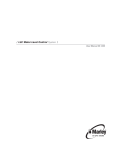
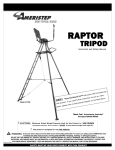



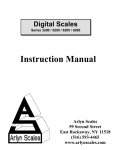
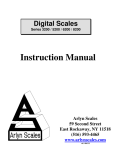
![[S30830T-CPE] Users Manual: CPE83SUE](http://vs1.manualzilla.com/store/data/005890174_1-2a1526c3cbd1c0db150881a0418c3ddc-150x150.png)

